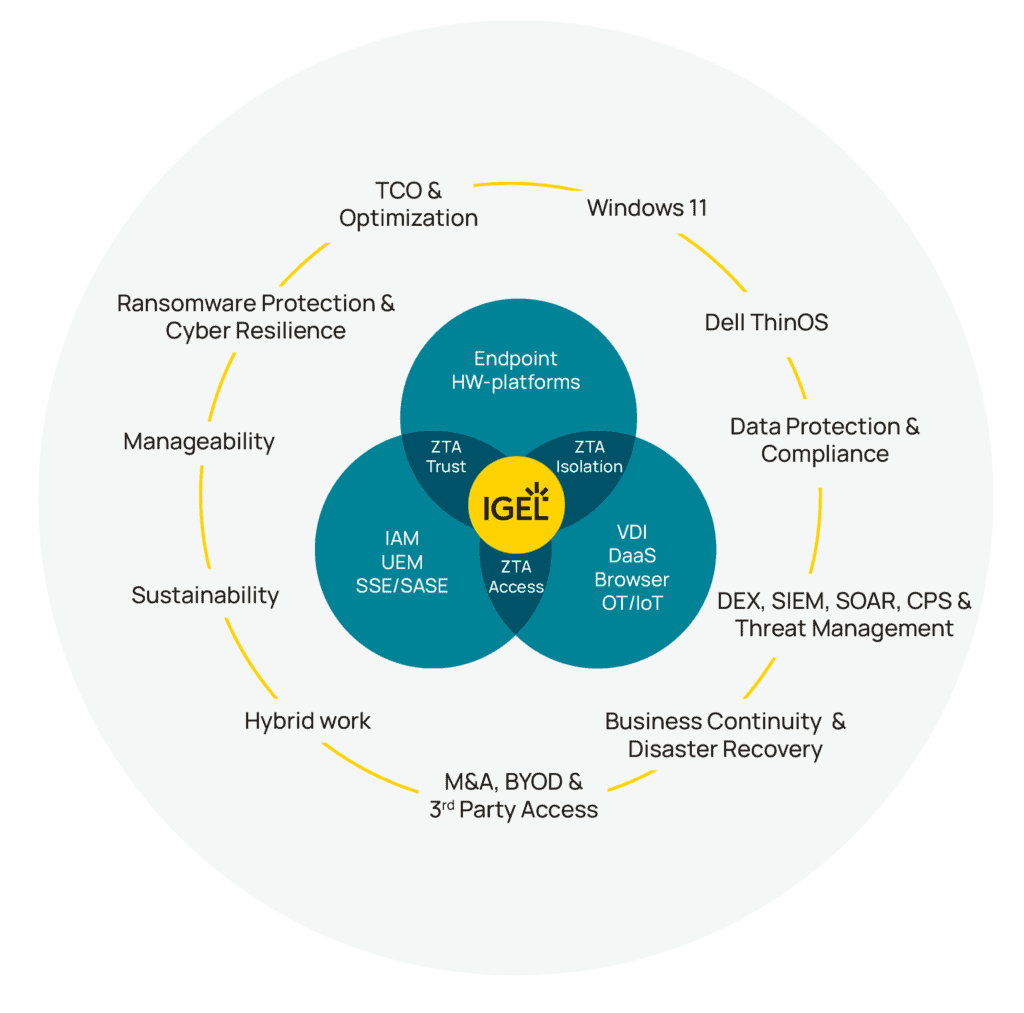IGEL Blog

Rethinking Endpoint Strategy with IGEL
For decades, endpoint strategies have been built on the assumption that compromise is inevitable. Layered tools, endless agents, and sprawling recovery workflows have all centred around designing for compromise failover — monitor, detect, remediate – a simple phrase that dramatically belies the reality of that process by the way. IGEL believes it’s time to break that cycle.

This needs to be the era of designing for failsafe.
Instead of relying on detection and remediation, the endpoint must be built to resist compromise — integrated, intelligent, and inherently resilient. IGEL’s Preventative Security Model™ is the strategic foundation for that shift.
This blog series unpacks the full scope of IGEL’s security and workspace transformation strategy in three parts:
- Preventative Security Model™ – IGEL’s unifying framework that aligns application access, security, and hardware strategy.
- Preventative Security Architecture™ – The enforcement layer that operationalizes failsafe and becomes your organizations Preventative Security Architecture.
- Adaptive Secure Desktop™ – A curated on-demand workspace that meets every user, role, and risk profile.
The Preventative Security Model
The Preventative Security Model (PSM) is IGEL’s approach to unifying modern endpoint strategies. It’s not an agent. It’s not a policy engine. It’s a philosophy — one that repositions the endpoint from a reactive risk surface to a strategic control layer.
And it’s built for a world that looks very different than it did five years ago.

The Endpoint Has Shifted — So Must Our Strategy
Enterprise computing has moved. Workloads have left the endpoint. SaaS, DaaS, and enterprise browsers now carry the weight of productivity. Users roam. Devices are fluid. Data must stay protected — without relying on where it physically lives.
IGEL is the constant in that transition. Both now and next.
The Preventative Security Model provides the framework that connects:
- Application access: Whether delivering full desktops, browser-based tools, native Linux apps, Progressive Web Apps, hybrid SaaS, or even Windows workloads, PSM enables five flexible delivery models — each tailored to user’s needs and risk posture.
- Zero Trust strategy: Zero Trust is a security model that assumes no user or device is inherently trusted and requires continuous verification of identity, context, and access for every interaction within a network. Zero Trust isn’t a product. You don’t buy Zero Trust from a single company. PSM integrates deeply with leading IAM, UEM, SASE, and SaaS vendors to enforce Zero Trust principles from the device outward for secure information access.
- Endpoint sustainability: With endpoints no longer requiring three-to-five-year hardware refreshes due to the simplified workloads, PSM supports long-term device reuse — particularly relevant as organizations scramble to meet Windows 10 EOL activities and deadlines, the EU’s Corporate Sustainability Reporting Directive(CSRD), and Environmental, Social and Governance targets (ESG)
- Operational flexibility: From remote onboarding to rapid reconfiguration during M&A, PSM provides the consistency needed to adapt at speed.
IGEL Ready – The Force Multiplier for the Preventative Security Model
PSM is powered by the IGEL Ready ecosystem — a diverse and growing network of partners across security, identity, peripherals, communications, and hardware. These aren’t just integrations. They’re certified relationships that extend IGEL’s strategy into enterprise environments at scale.
Through IGEL Ready, PSM supports:
- HP, LG, Lenovo, and other leading OEMs to ensure secure, performant hardware compatibility.
- Identity platforms like Microsoft’s EntraID, Omnissa Workspace ONE Access, Imprivata, Okta and Ping for integrated SSO and MFA.
- Security vendors including Zscaler, Palo Alto Networks, and Netskope for Zero Trust and SSE enforcement.
- Peripheral support for clinical, financial, manufacturing, government and retail workflows — including smartcards, speech mics, OT equipment, barcode scanners, document scanners and signature pads to name only a few.
Together, this ecosystem ensures that IGEL endpoints can sit at the centre of a modern, multi-vendor Zero Trust strategy — without friction, without fragility.
Strategic Outcomes Delivered
The Preventative Security Model is not just about securing endpoints. It’s about enabling enterprise transformation. Across industries, PSM is already delivering impact:
- Business Continuity: Fast recovery of compromised traditional endpoints utilizing the in-place hardware
- M&A acceleration: Standardize and secure diverse endpoint fleets across acquired orgs without rip-and-replace.
- Windows 11 readiness: Shift Windows to the cloud, maintain existing hardware, and simplify support.
- Sustainability, CSRD and ESG: Extend endpoint lifespan, reduce e-waste, and align IT with carbon reduction targets.
- Zero Trust execution: Connect policy enforcement from identity to device, in real time, at scale.
Where traditional endpoint stacks are reactive and bloated, PSM is lightweight, adaptive, and policy-aligned — a failsafe foundation for the cloud-first enterprise.
Next up: Preventative Security Architecture, where we explore how IGEL OS eliminates attack vectors and enforces failsafe security by design.


